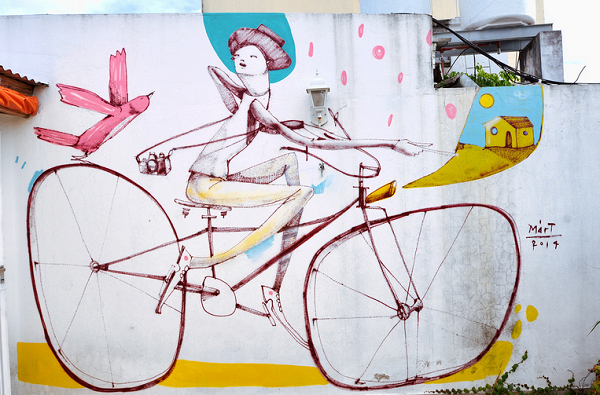Riding a bike in Tennessee – where I live – can be challenging. Some roads have clearly-marked bike lanes, but most cars barely notice cyclists. There are no bike lanes on major roads. Cars zoom past cyclists on blind hills, barely missing other cars coming towards them from the opposite direction. When I cycle, I try to be excessively cautious, and pull over so cars can pass me safely. I don’t want to be responsible for a head-on collision anymore than I want to be hit by the car. Seems to me like cars and drivers ought to work in concert, rather than oppositionally.
I used to live in California. More people bike to work in California than they do in Tennessee, but Californians are not much better at sharing the road with each other they are in Tennessee. The San Francisco Chronicle would regularly publish letters from both cyclists and drivers complaining one about the other. One driver wrote that she was sick and tired of cyclists running stop signs, and not obeying the traffic laws. Another complained that cyclists would take-up the entire road, two or three bicycles deep, just so cars couldn’t pass. The cyclists would complain that cars passed them without clearance, jeopardizing safety and forcing some bikes off the road. One cyclist wrote that a car cut her off when it turned right directly in front of her without signaling or yielding the right of way, as required.
When engaged in the particular activity, a cyclist thinks like a cyclist and a driver thinks like a driver, each dualistically and somewhat exclusively, but perhaps you can see the irony of such either-or thinking. I am both a cyclist and a driver. Most cyclists are. We ride for pleasure and drive for work, or drive for family and bike to work. I ride my bike in early mornings for exercise, but many days I drive to appointments. I know fathers who drop their kids off at school and then cycle for solitude. One woman rides her bike to work, and drives home at the end of the day, only to reverse her process the next day. In other words, most cyclists are drivers, and many drivers are or have been cyclists. Wasn’t it Pogo who said, “We have met the enemy, and he is us.”?
American politics and American religion are equally dualistic. You are either Republican or Democrat. You are either conservative or liberal. You are either Catholic or Protestant, either evangelical or progressive. Politics and religion treat life as oppositional, about the positions you hold, the thoughts you have. But as my second-favorite bumper sticker advises, “Don’t believe everything you think.” (My favorite bumper sticker is, “God is NOT a Republican … or a Democrat.”)
Will dualistic thinking make us better or worse Christians? I am convinced that God cares far less about any particular position I hold than she does about the way I engage the people around me. Whether I love. In fact, Jesus criticized the Pharisees for their dualistic approach to religion. Love God, Jesus confounded them. I don’t recall Jesus ever saying, be right, but he did say, love your neighbor. Paul observed that being Christian has everything to do with the approach you take to those around you: Love does not insist upon its own way, after all. And James, pure and undefiled religion is [an action:] to care for orphans and widows (those in need) and to keep oneself unstained from the world.
When Pope Francis visited the United States a few years back, both Democrats and Republicans clamored for his attention, each assuming that the Pope would be more likely to side with them on issues. (pro-life, against capital punishment, etc.) But the Pope acted as though the faithful life is not about the church’s correct positioning any more than it is about the human element. Hence, observed one person, “I’m sure the Pope will make everyone very uncomfortable. There will be some things that Democrats may not like to hear, and there will certainly be some things, I think, the Republicans will not like to hear.”
Sounds like Jesus to me.
So what do I do? I am driving my car and about to turn right. There is not a bike lane, but the cyclist to my right wants to go straight. I have the right-of-way. Do I have the moral authority to turn into her? Time to slow down and wait. I never need to be in that kind of a rush. Now that I think about it, I never need to be in a rush.

